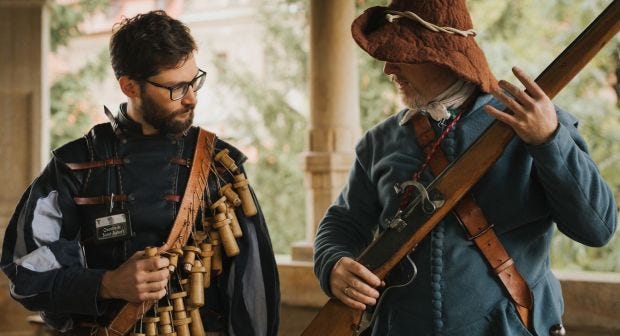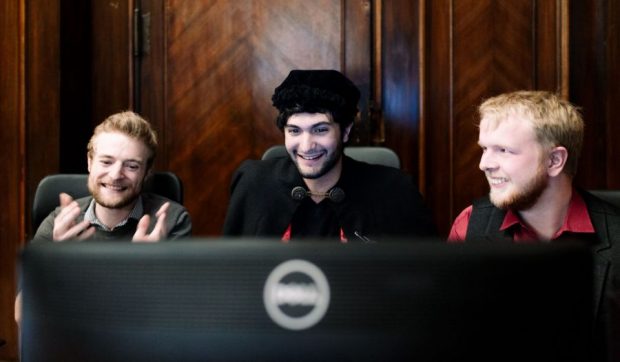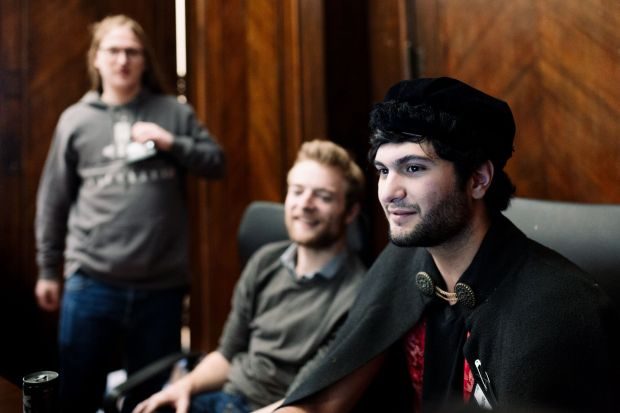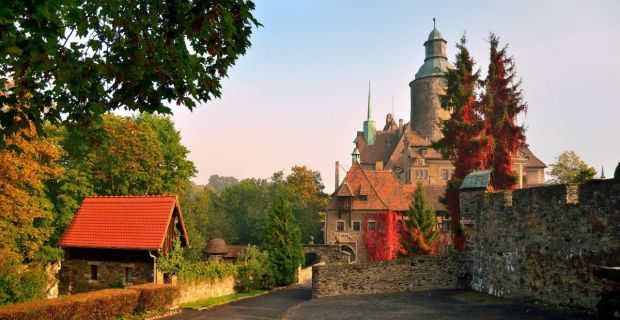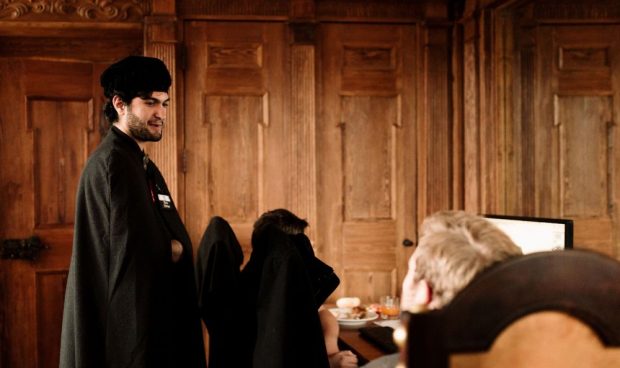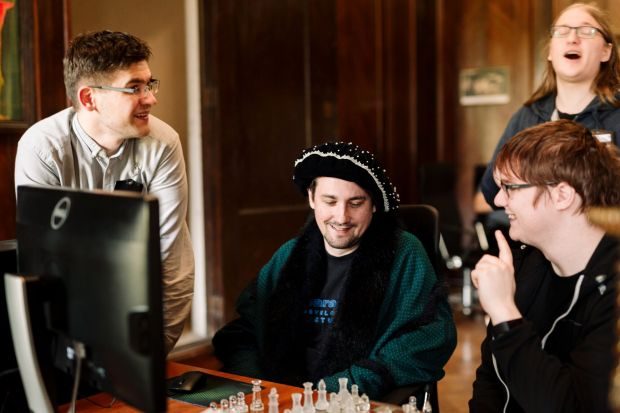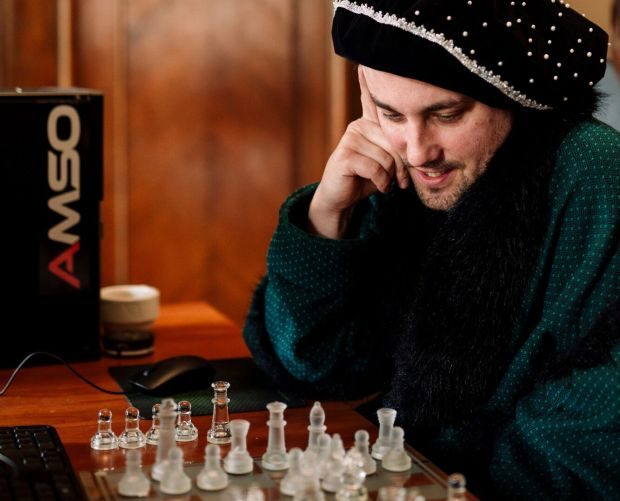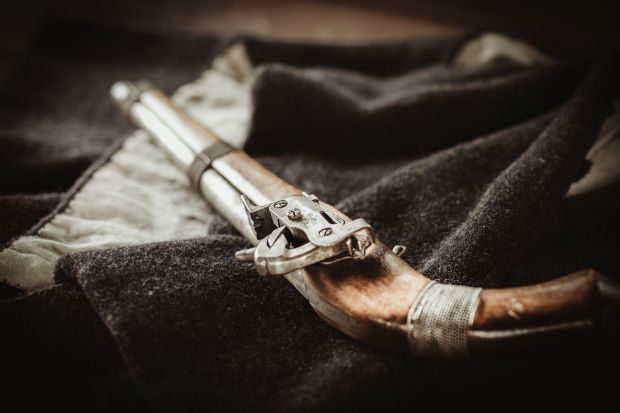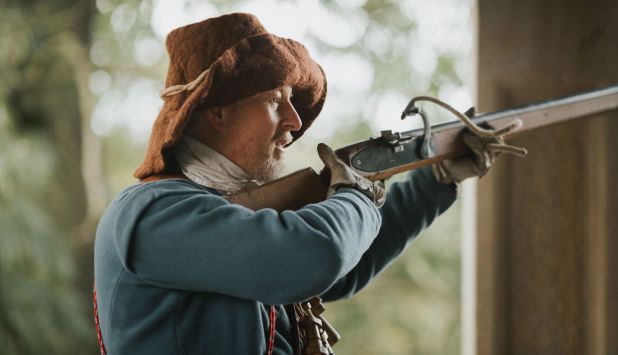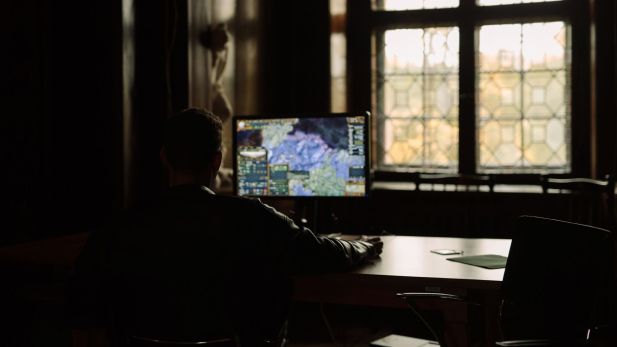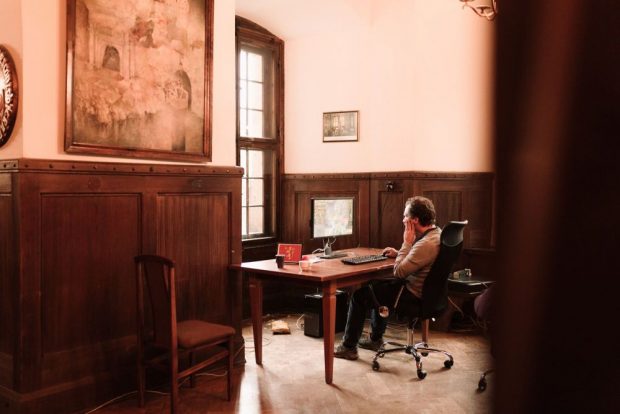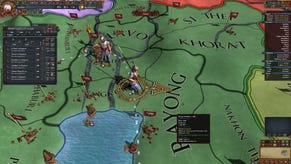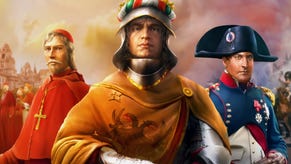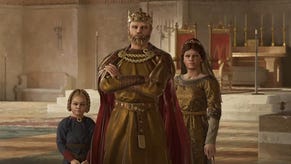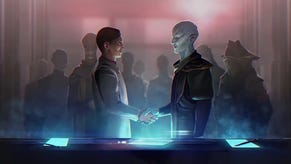Kings of the castle: the forty-person strategy game of Europa Universalis IV held in a Polish fortress, part 2
Of Mughals and men
We sent Brendan to a castle in Poland to witness a giant session of strategy game Europa Universalis IV [official site]. In this final report, he tells us of the manipulative merchant kings of India, and how blood money corrupted the world. You can read part 1 here
I’m eating soup with the ministers from Malaysia, Italy and Bavaria when the head diplomat of Mughal India comes to our table and starts talking about money again. His long black robe flows over his thin frame, a matching velvet cap on his curly dark hair.
“The Ottoman have trade locked up,” he says. The Italian minster smiles. You can always trust a Mughal to talk about markets. Soon, all the world leaders at the table are speaking in impenetrable detail about world affairs - intricacies and intrigue, money and merchants. It’s like sitting in a restaurant with the Illuminati. They smirk, they joke, they laugh. Tomorrow, they will be at war. Anywhere between 7-10 million people will die.
For anyone catching up, I’m living in a castle surrounded by young men who run the world. The Norwegians are squabbling with a finally-united Ireland, the Moldavians have assimilated into Poland, and the boys who run Brunswick have transmogrified into the nation of Hanover, and are consistently celebrating every century that passes with pints provided by the castle’s kitchen staff. History is difficult and the European continent is a shambles, with frequent outbreaks of fighting over territory. The Pope has been dead for years.
But there is a spectre haunting Europe. The spectre of capitalism.
We three kings
“These Europeans,” says Florens, “they give away their clay like...”
The Mughal king trails off, waving his hand in the air as if to swat away a bothersome fly. He is a leader of one of three Indian nations. Florens (or ‘Florry’ as he’s known in the Europa Universalis sphere) is a sometimes-streamer, sometimes-waiter. A confident figure, he is often found walking around the castle wearing a smile and the ahistorical cap of a steamboat captain, something he found in the box of costume props provided by the event’s organisers. He is a ruthless manipulator of world affairs.
“I’m going to see what’s happening with our investment,” he says, leaving the room where his team mates distribute mouse clicks among their spreading Indo-Chino territories. “I don’t want them to ‘white peace’.”
He’s talking about Norway. The Mughals are bankrolling the Norse, paying them to attack various other European nations as part of a larger conflict. Florens and the Mughals don't want a ceasefire. The war must go on, and the Indians can afford to fund it thanks to their stranglehold on trade in the east. This is a complicated system to explain, but basically there are parts of the in-game map where money flows in a cascade. If you control these trade nodes and place merchants in a sensible way, you stand to make a lot of money. To illustrate the contrast between continental wallets, Europeans often had a few hundred ducats whenever I glanced at their coffers. At the height of its power, the Mughals had over 61,000. It helps that all three Indian player-nations made an agreement at the start of the game not to attack one another, turning what the players had been calling “the Indian thunderdome” into the “Indian peace-and-love-dome”.
But peace is an exclusive commodity. The Mughals, in their quest for influence, have also paid off the national debt of a somewhat more prickly nation: Prussia. Yesterday, some of the antagonistic nations of Germany foretold of a Prussian beast forming out of the soil and soldiers of Pomerania. Today, that prophecy is a reality, and nobody can do much about it because the Indians are pumping financial fuel into every battle the militaristic Prussians are prepared to fight. Currently, they have given over 7,000 ducats to their new "client state", in order to fund an Anti-German war, itself the result of a grand conspiracy between bickering and distrustful European states.
By comparison, the Indian nations are calm and resourceful. They even all got together on the second day and occupied the same room. This is because each day starts with a randomised scrambling for the best seats and computers in the castle, itself a small contest of political sniping and power-plays, as nations vie to be seated close to their allies and far from their enemies. On the second day, the Indian nations of Mughal, Persia and Vijayanagar were living side-by-side in what would they would soon call, in a show of international arrogance, the “management room”.
Late in the evening I encounter Florens of Mughal on one of the castle’s narrow stairwells. He has been in the “alchemy bar” playing dice with a military general from Hanover. I ask him about their funding of the recent war.
“We stretched our finances a little,” he says, in the manner of a middle-class dad talking over a glass of Chardonnay. In the end, he says, they sank over 10,000 ducats into the Prussian war machine and were only now becoming concerned with the lack of return. What did he do in the end, to extricate his country from this expensive war?
“I just went into the German’s room and I said: We. Are. Bottomless.”
The war was over within the hour.
Debt in the water
Not all nations of the east are rich, however. From its small beginnings as a country engulfed in civil war, Japan has been quietly floating from room to room as the days in the castle pass. They’ve also been taking quite a lot of loans. There is an unseen, in-game bank, under which players can borrow money and pay back with interest. The friendly rulers of Japan, two French Canadians and one German, dressed in robes and spectacles, have been overly fond of financing their navy this way. Taking ten loans in a single decade has catapulted them into an impossible spiral of debt, becoming the poverty-stricken Ying to the Mughal’s Yang. They are currently seeking a bailout from their affluent neighbours.
I watch as they start clicking through the options on their screen, imposing harsh austerity measures on the nation. They cut research funding, end military maintenance grants, postpone all expansion efforts, order all their ships back to their harbours and – more or less – fire all the sailors in the country. They are still on track for an eventual bankruptcy, but there is one last hope. They are waiting for a gold mine to appear in the Echigo province on mainland Japan. This is a scripted event, something that triggers around this time in history, and which they know about from previous games. They inspect Echigo closely.
Time passes. The Shoguns sit around, fiddling with their budget and dismissing “decision-making” pop-up events, always selecting the cheapest possible option. One of them eats a modest bowl of aubergine stew appropriated from the castle’s kitchen. They sit together and wait for the gold mine to appear. I ask them, in the worst case scenario, how long that might take. One of them thinks for a moment.
“15 years.”
Irish spice
I have decided to leave the east for a while, and return to my homeland. Moises, the regent of a recently-united Ireland, is annoyed with the Norwegians. Theirs has been a tense relationship ever since the Norse took some Scottish land hundreds of years ago and subsequently lost it to the Irish in one of Europe’s many scuffles. On the first day of the game, both nations told me of their desire to conquer and form the islands of Great Britain. They were destined to be rivals.
Out of curiosity, I ask Moises of Ireland if he has had any contact with the Indian nations.
“Yes,” he says, “they tried to bribe me.”
Their offer was tempting. The Mughals wanted to set up a spice trade, a funnel of goods that would increase profits for everyone involved, but especially for themselves. They suggested Ireland use its new colonies in the Americas (they own Cuba, don’t ask me how) to form a trade route to Asia. In return for all this they were offering the Irish 1000 ducats. After some deliberation, Ireland refused. If they “sold out” to the Indians, Moises reasoned, much of the rest of Europe would be furious.
As Moises is explaining this to me, the absentee king of Ireland runs into the room. He's giving orders. Ireland needs to prepare. They need to be ready. Another fight with Norway is on the horizon. Why? Because the Norwegians, less discerning than the Irish in their business partners, have supposedly accepted the very same spice trade agreement with the Mughals, using their own colonies in the Americas as a link.
It's a tense moment. But no sooner than the Irish king leans over his regent to start preparing his troops for war, does Florens the Mughal swagger into the room.
“Are you going to war with Norway!?” he demands.
“Yes.”
“I will pay you not to do that.”
The Irish look at him. They're listening.
After some time, they negotiate a deal, and Ireland ends up swinging the spice trade back into their own hands, now unconcerned with what the other Europeans think. They've secured 3000 ducats. Later I will meet Florens of Mughal as he smokes leisurely on the bridge over the castle’s moat. Here he would explain to me that such a sum would take the Irish 40 or 50 years to make on their own. But does he think they'll spend the money wisely?
“No, they’re just going to fight each other,” he laughs, turning back to the fortress. “It will be spent on blood.”
A "real" war
Europe is on the brink of another war. Yet this war is not over land, or trade or religion. It's mostly happening because people are bored. If I could pick a dual source of conflict which casts a shadow over the castle’s combatants it would not be Church vs State or Catholic vs Protestant or even East vs West. It’s people who want to fight vs people who don’t. The Hanover boys want to fight.
At the minute, however, they’re stuck in an inconclusive white peace with their usual European sparring partners, the serious Prussians. Even the massive battles of this most recent war, involving 350,000 soldiers and bankrolled by Indian money, were not enough to finish off either nation. But wherever there is the muck of war, the Hanover boys will come wallowing. They’ve thrown off the Brunswick name, yes, but that same balled-fist of a spirit remains.
I'm sitting with them when the money man shows up. The Mughals have sent their envoy, Mario, to engage in some diplomacy. He enters the German’s room like a Sith lord, black cape flowing behind him, a portentous grin on his face.
“So what’s going to happen is...”
He lists off countries and alliances, reeling out a line-up of fights. He’s pitting country against country, as if organising some sort of international Wrestlemania. The Hanover boys listen, with appalled looks on their faces, as Mario the Mughal informs them they are to battle the Netherlands. Stewart of Hanover rounds on the envoy immediately. Why would they fight their current closest ally? Their next door neighbour? And why would they do anything the Mughals say, for that matter?
The Indian diplomat tries to stammer out an answer but is soon silenced by five voices in the room who have suddenly rallied against him (the Bavarians have joined in, just to shout). Mario smiles a nervous smile, perhaps now acutely aware of his gaffe. He has entered the room all cloak, no dagger. The haughty imperialistic attitude of the rich Mughal nation, who appear to understand little of complex European politics, has become a source of obvious friction. There’ll be no war today.
But their unsubtle plotting won’t stop the Mughals from trying. By the end of the day they will have sent out a call to all nations, dispensing with niceties and diplomacy altogether and acting as they truly are - as playboys of the eastern world.
A reward, they say, of 20,000 ducats will go to the nation who starts a “real war” within Europe, along with 50 ducats per month for as long as the fighting lasts. This is a jaw-dropping sum of money for the poorer nations of Europe, and a bribe of such manipulative force that it leads Edin of Saxony, who makes this announcement from the balcony of the grand hall, to refer to it as “some kind of fucked-up Pokemon fight.”
“They have stipulated,” says Edin to the crowd of ministers and military chiefs assembled below, “that a ‘real war’ must result in at least one million deaths.”
Shāh māt
When I arrive in Persia, the Shahs are playing chess. It is the fourth day of the game and they’re barely looking at their computer screen, instead focusing on the odd shape of the black player’s front lines. The players are Jake Leiper and Björn Blomberg, and they are perhaps less involved in international affairs because they work for Paradox, the developers of Europa Universalis IV. Their vast nation stretches across the Middle East and the Indus valley, Islamic in practice and yet “officially Hindu” for bureaucratic reasons that I will never understand. They often sit out of conflicts, or watch from the sidelines. They stopped expanding long ago but recently began hiring out their entire army to anyone who could afford it. They've become, for a joke more than anything, a mercenary kingdom.
Right now, there’s no client. So they simply contemplate the chess board and allow the years to pass. Jake has been making, by his opponent’s estimation, some “unorthodox moves”. Apart from the mercenary business, Jake runs a mostly-neutral country. Björn is even more easy-going, often found fiddling with stacks of soldiers or idly inspecting each province as if calmly making his way through a ledger.
Today, however, there’s a hiccup. The Mughals are nowhere to be seen. Their hallowed place in the “management room” has been taken by the Moroccans (latecomers who now own swathes of Africa). But the game must go on. Since none of the Mughal players can be found, their nation becomes controlled by an AI civil service who starts the day by abruptly ending important alliances and acting more or less like an unpredictable fool.
Despite this, the Shahs look calm and collected. They’re not worried about their new computer-controlled neighbour. One of them tells me that a human will always have the edge. From anyone else, I’d be skeptical of such confidence. But I’m inclined to trust in the tranquillity of the two chess-playing Persians. After all, they invented this game.
Room 203
I find Florens the Mughal slowly roaming the second floor of the fortress with a confused look on his face. He’s like a lost sheep, looking for his team mates, he says, in room 203. But he can’t find it. I follow him along the corridor where we pass room 202 and 204, but no room 203. The logic of this castle’s twisted innards is something beyond both of us, but especially Florens. He’s hungover.
Last night the Mughals stayed up until 6am playing poker with the ministers from Hanover, Moldavia and Japan. As befitting a nation with a literal pile of coins on their table, the Mughals took part in many wagers. Unfortunately for them, it wasn’t coins or chips in the pot, but drink, each raising of the stakes another slug or two of harsh spirits or fizzy beer. Judging by their absence at the daily starting time of 10am, the Mughals really do think little of throwing their “money” around.
“A country run by idiots,” says Florens. He’s talking about the Indian AI civil service reigning in their stead, but this morning it is an assessment that could just as easily apply to the three merchant kings.
I leave Florens to his search and do my rounds, talking to diplomats, war chiefs, regents and generals. Later, I will find the three merchant kings relegated to a computer in the cavernous “Polish room” - the very place they gambled away their sobriety the night before. The waist-coated Robin concentrates on the map in front of him. Darth Mario has lost his cloak but gained an impressive capacity for burping.
Muskets at lunch time
I wake up to the sound of muskets. Outside, a set of world leaders fire flintlock rifles into the air, as a final war brews in the castle’s interior. While I’ve been napping (virtual war correspondence is hard work) some Europeans have accepted the blood money of the Mughal empire and the whole continent is gearing up for an ultimate, all-encompassing war. The Mughals themselves are getting ready to march their troops thousands of miles to the Prussian border, where the future of the world will be decided. Even the quiet Malaysians and the cash-strapped Japanese will take part in this final round of bloodshed. I would like to paint this global conflict as the result of broken promises and treacherous deal-making. In reality, it is the most practical war to date. Everyone in the castle just wants a final fight before they go home.
Of all the warring nations, I embed with the Mughals. They have a secret plan. The merchant kings want to force a change of government and become “Revolutionary Mughal”. But to do this they must take a page from the Persian book of chess, and make some “unorthodox moves”. You see, at this period in the 1700s the game enters an “age of revolution”. This means revolutionaries can spawn in your territory and, in the right conditions, take over and rule the nation. Far from being a pain, becoming "revolutionary" brings bonuses that make your country a more fearsome warrior.
As I watch them fiddle with their country and its laws, the whole thing seems counter-intuitive. They actively encourage rebels to appear in specific parts of the country, welcoming angry red-coloured troops into their provinces. They have also made the bizarre decision to move their empire’s capital to the Shetland islands (purchased from the Norwegians, of course). These are all measures to bamboozle the game into granting the country revolutionary status. The hungover Mughals are concentrating as they manoeuvre to pull this tricky move off.
But the plan backfires. A lapse of attention – the hungover misfiring of brain cells or perhaps simply an “administrative mistake” - sees the capital moved out of the Shetlands and into Africa. Suddenly, the revolution won’t take hold. The cogs of the game don’t match up, someone consults the wiki on their phone – the capital must be in Europe. They move the capital back to the rainy northern islands, trying again to figure out the complex steps necessary to throw off their merchant ways and become a fiery nation of upstarts. But the moment has passed, the world war will soon begin, and now their entire country is infested with rebels for no benefit.
The Mughals dive into the war, abandoning the revolution. They send their troops north, legion upon legion of fighting men travel across Kazakh mountains and Russian rivers to join their old friends, the Prussians. In 1757 they finally reach their allies. Cries go out from around the room, where other European countries sit.
“The Mughals have arrived!”
“The Mughals are here!”
Over one million soldiers pile into a single province, at Kauen in modern-day Lithuania. Troops from all over the continent die in a battle lasting days, as Florens of Mughal, hand on the mouse, looks on. He watches as the numbers diminish, as a small green bar turns slowly to red.
“I didn’t have enough infantry,” he says.
Florens runs through his options, thinking aloud. The Prussian troops withdraw, the Indians alongside them. There must be some way out of this. Some way to scramble back from this seemingly decisive loss on Europe’s doorstep. “We need a trick of some sort...”, he says, searching both his mind and the screen as more rebels appear in their Indian homelands. Looking on, the de-cloaked Mario offers his opinion.
“I think, uh, we’ve hit a breaking point,” he says.
“We’re not bankrupt yet.”
“We will be soon.”
Florens keeps looking at the screen, but he doesn’t argue.
“Yup.”
I can’t hear it through the castle’s twisted innards, but I have a strong feeling the Hanover boys are cheering.
When men make LANs
That evening, the Saxon organisers of the game project a timelapse of the past 400 years onto the floor of the grand hall. The war is over, we have reached the end of history. And it only took the deaths of about 7-10 million people.
There were many silent parts of this global story. The Malaysian conquest of South America, the Japanese formation of Canada, protestant Ireland’s disastrous forays into Madagascar and East Africa. I never mentioned Norway’s three wars for independence, or the Moldavian growth spurt, nor the ousting and poetically just return of Vijayanagar to India. All these episodes are part of a world which now exists nowhere else but in the memories of its kings and an EU4 save file (and in this article of course - they say history is written by the winners, but it’s actually done by tired journalists).
I don’t know if I learned anything from this excursion, apart from: if you put 40 men in a castle and tell each of them they’re the king, there’s going to be a fight. But it was illuminating to see how each nation defined Power. There were those who coveted the sovereignty of land, and those who measured their weight in military strength. There were diplomats whose influence was informed by legalism, and kings whose authority was fuelled by endless coin. Tonight, the leaders of the world will mingle, they will watch fire dancers and drink, as in some strange Valhalla. They may have created a vastly different world from our own, but in the most important ways, it was eerily familiar.
All photographs courtesy of Nadina Dobrowolska from Dziobak Larp Studios
